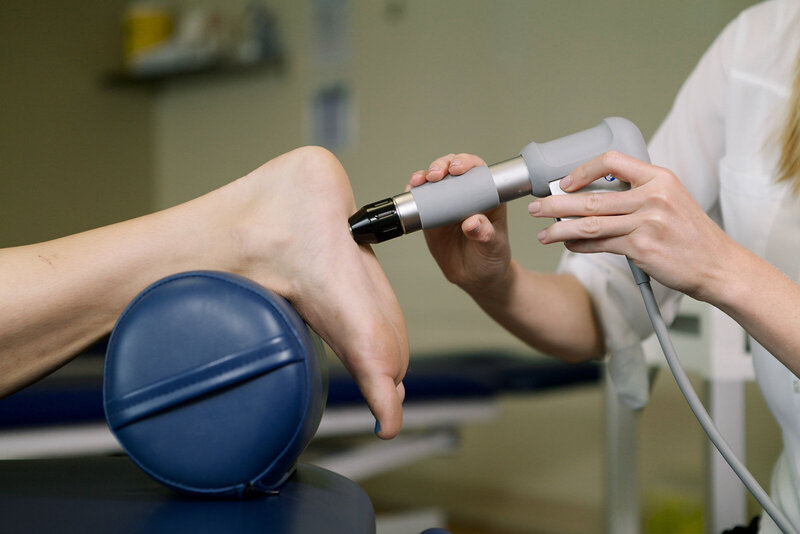Shockwave Therapy for Plantar Fasciitis


Michelle DeMarchi
BSc PT, DOMP
Physiotherapist, Pelvic Health Physiotherapist, Bracing Specialist
Do you have heel pain or plantar fasciitis? Is it impacting your daily function? Are you sick of it? If you answered yes to these questions, shockwave therapy may be suitable for you!
Shockwave therapy has many proven benefits, such as increased tissue healing, decreased inflammation, scar tissue breakdown, better circulation, improve pain, and so much more. With very few side effects, shockwave therapy could be extremely beneficial to get you back to the activities you love!
This blog post will focus on shockwave therapy specifically for plantar fasciitis, and will hopefully answer any questions you have. Keep reading to learn more!
What is shockwave therapy for plantar fasciitis?
Shockwave Therapy is a modality that can be used to help promote healing in the tissues in the body that aren’t healing on their own.
In plantar fasciitis specifically, there is inflammation in the tissues at the bottom of your foot that connect your heel bone to your toes – the plantar fascia. It can be caused by many things, like footwear, foot structure or overuse. This can cause a lot of pain in the heel. Shockwave works to enhance blood circulation to help regenerate the damaged tissues in the bottom of your foot and heel.
Shockwave works to provide you with relief to help you get back to the activities you love! Although shockwave therapy for plantar fasciitis can be used on it’s own as a stand alone treatment for plantar fasciitis, you may need to combine it with other physiotherapy treatment techniques such as soft tissue massage, exercise, and education on activity modification.
Curious about how we can help you with your plantar fasciitis? Keep reading to learn more!
How shockwave therapy works for plantar fasciitis?
Shockwave therapy is done using high energy pulses that deliver sound waves to the injured tissues to help repair growth. Keep reading to learn more about how shockwave works, specifically for plantar fasciitis!
Shockwave therapy applies a mechanical pressure on the plantar fascia to promote healing and help break up any calcific deposits in the region. The energy pulses stimulate both osteoblasts and fibroblasts, which are cells that are important for healing bone and connective tissue! It also increases the blood flow to that region, which allows your body to help speed up the healing process!
In turn, this will also decrease inflammation around the tissues in the foot and heel, and thereby, reduce pain! More questions? Read more about shockwave therapy here!
Benefits of shockwave therapy for plantar fasciitis
Shockwave therapy has a wide range of benefits for the treatment of plantar fasciitis! Shockwave therapy can help break down scar tissue and calcifications in the foot and heel, but also works to improve circulation to the feet and release potential trigger points in the muscles in that region! Some of the muscles that may be affected in plantar fasciitis include the gastrocnemius and soleus (your calf muscles), and all of the little intrinsic muscles of your foot.
But most importantly, It helps to reduce the pain in your foot and heel to allow you to get back to the activities you love to do! Why wait? Book your appointment today to get on the track to less pain!
When can I expect to see improvement after shockwave therapy?
Everyone reacts to shockwave therapy differently, so it’s hard to tell when exactly you will see improvement following the treatment. BUT, good news! Typically, people will feel improvement after a few weeks of shockwave therapy, with benefits lasting months or even YEARS! Some people will notice benefits after just a few sessions, where some other people may need a little more time before they notice benefits.
Whatever the timeline, there are SO many patients that find shockwave to be an extremely beneficial treatment for their pain. Click here to read more about what patients have to say about shockwave therapy at PhysioPlus Health group!

Side effects and risks of shockwave therapy
Shockwave therapy has very few risks or side effects, but it is always important to review and understand these so you can make an informed decision about trying shockwave therapy! Some of the side effects may include:
DISCOMFORT
A little bit of discomfort or mild pain is typical with shockwave therapy – however, the treatment only lasts for a few minutes so the discomfort is very short lived!
REDNESS
Redness is a typical side effect of shockwave therapy and usually occurs in the affected area following the treatment. Just know this is temporary, and should resolve on its own – nothing to worry about here!
TENDERNESS OVER THE AFFECTED AREA
Following a shockwave therapy treatment, you may experience some mild pain or tenderness over your heel or foot for about 24 hours. It doesn’t feel any worse than a bruise! This is normal and just signifies that the treatment is working – don’t worry if you don’t feel this tenderness, the treatment process is still working! Everyone just experiences things differently.
If you have any other questions about the side effects you may be feeling, please don’t hesitate to CONTACT OUR CLINIC TODAY!
Finding a Qualified Shockwave Therapy Provider
Looking for a qualified shockwave provider? You’re in luck! PhysioPlus Health Team has many qualified providers! These individuals are shockwave experts and can answer all of your questions to ensure that you feel confident and comfortable receiving this treatment.
Have more questions about shockwave therapy? Click here to learn more from one of our very own shockwave providers here at PhysioPlus or CONTACT US!
This blog was written by Madison Allan, a Physiotherapy student at the University of Toronto
MEET OUR SHOCKWAVE EXPERTS

Chantelle Blanchette
Registered Physiotherapist

Sarah DeBoer
Registered Physiotherapist (FCAMPT)

Jennifer McConvey
Registered Physiotherapist, Certified Vestibular Physiotherapist

Demetria Correia
Registered Physiotherapist

Martin Petkov
Registered Physiotherapist

Lauren Kanko
Registered Physiotherapist

Lauren Rimmer
Registered Physiotherapist

Dr. Jeff Belgue
Registered Chiropractor
FREQUENTLY ASKED QUESTIONS
Can I resume normal activities after shockwave therapy?
YES! There is no reason that you cannot resume normal, light activities following shockwave therapy. There are no issues with driving, housework, your job, etc.
However, we urge you to refrain from higher intensity exercise for approximately 24-48 hours following shockwave therapy treatment to get the most benefit and allow those tissues to heal.
If you have any questions about what to do or not do following your shockwave treatment, feel free to contact us at (416)760-8280!
Is shockwave therapy covered by insurance?
Typically, if you have insurance coverage for services such as physiotherapy, chiropractic, and chiropody, then shockwave can be covered under those providers (if they are the one to provide you with the treatment).
If you aren’t sure if you have coverage, you can always check with your insurance provider to see what you have coverage for! Everyone’s insurance plans look a little bit different, so it’s always a good idea to confirm with your insurance provider.
Are there any contraindications for shockwave therapy?
This is a great question and one that your shockwave provider should talk to you about prior to your treatment! Before receiving shockwave therapy, your provider will ask you some questions to determine if there are any reasons that you should not receive shockwave. This will help rule out any risks! Some contraindications for shockwave therapy include:
-Tumor
-Open wounds
-Pregnancy
-Over a pacemaker
-Infection
-Blood clotting disorders
Always check with your provider prior to treatment and ensure to disclose if you have any of the conditions mentioned above! If you have any other questions, please feel free to CONTACT US today!

